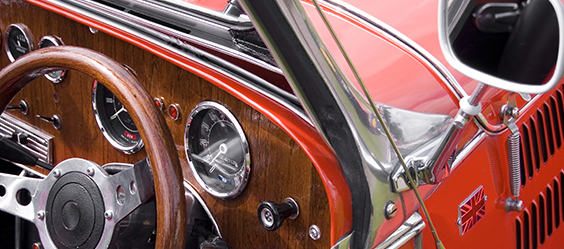Private client insurance brokers
enquiries@castleacreinsurance.comLondon: +44 (0)203 966 3614
UK: +44 1787 211 155
Classic Cars – How to get the best from your insurance

- 17 September 2018
- Comments: 0
- Posted by: Castleacre
What are some of the key considerations when insuring a classic car?
Classic car owners are often passionate about their vehicles and want to ensure that they are protected properly particularly as repairs usually require specialist garages and scarce and expensive parts, so how do you get the best out of your insurance?
Top Ten Tips
1. Are you using your classic car as an every-day vehicle?
Most classic car policies are based on the assumption that the vehicle will not be used for every day commuting, school runs etc, limiting the risk to just “social domestic and pleasure purposes”. Insurers will usually check by confirming that the owner has a more practical every day vehicle for their daily routine but if you do enjoy driving your car to work tell your broker, who will try and find a policy which will allow you to use your vehicle more regularly.
2. Low Annual Mileage on a classic vehicle can bring benefits
As most classic vehicles are driven infrequently (especially in the UK where sunny days are usually few and far between) the annual mileage is limited. You should benefit from a lower premium level f you anticipate a low annual mileage but be cautious, as exceeding an annual mileage cap can invalidate cover or carry hefty additional premiums.
3. Who will be driving your classic car?
If you think a dashing MG TF 1.8 is a perfect present for your 19 year old you may need to think again! Most classic vehicle insurers do not provide cover for drivers under the age of 25. While many classic cars are not necessarily high value or high performance, they can be difficult to handle and expensive to repair, so specialist insurers are reluctant to insure an inexperienced young driver.
4. Are you a member of a classic car club?
Some classic car insurers offer discounts to vehicle owners who are a member of the relevant car club or association. The idea behind this is that those who join car clubs are “real enthusiasts” and insurers believe that these owners are more likely to take particular care of their vehicle.
5. Special cars require specialist insurers.
Your classic vehicle should be on cover with an insurer who is experienced and capable of handling a claim that provides you with the best outcome. An insurer who understands classic vehicles will give you the option of taking your vehicle to a repairer of your choosing in the event of an accident, rather than insisting on one of their approved local garages. Choice of garage is particularly important for classic vehicles. There may only be one specialist classic car mechanic or garage you can use to repair your car and they may be located in a completely different part of the country.
6. Do you require cover for time on the track with your classic car?
Most classic vehicle insurers do not include cover for track days, time trials, racing etc., but many classic car enthusiasts really enjoy taking their vehicles to car shows and track events where this cover would be required. Track cover is expensive and only one or two insurers provide this as part of a classic car policy so it is important to consider this at the outset when you are talking to your broker or insurer.
7. Accurate Valuations for Classic Vehicles
It is always a good idea to have your classic vehicle regularly valued by a specialist so you have adequate cover in place. Classic cars can fluctuate in value quite alarmingly. For example; the 1961 Jaguar E-type once described by Enzo Ferrari as one of the most beautiful cars ever made, would have set you back £30,000 in 2009, 9 years later you would be lucky to see much change out of £120,000 – a 300% increase in value.
8. Agreed Values
Classic car insurers can offer agreed value cover, which in essence means the value of the car is agreed by the insurer, and the client, at quotation. Agreed value cover can be more expensive but it usually significantly reduces the risk of any potentially frustrating claim scenarios as there is no argument about the value of the car. To arrange agreed value cover, the insurer will either ask for detailed photographs of the vehicle or a professional valuation. Valuations are often free of charge, as an accurate value benefits both the client and the insurer.
9. What makes a vehicle a classic?
The age old question that no one truly has a definitive answer to. As a very general guide you could describe a classic as a car over 10 years old which is used occasionally and has a provenance that establishes it as one of a limited or dwindling number of models. Is the trusty BMW estate you’ve owned for 11 years, without issue, now classed as a classic? Probably not. The definition of a classic is of course much more nuanced and my advice would be check the eligibility with your broker or insurer.
10. Can classic and routine vehicles be covered under the same policy?
In theory the answer is yes but in my experience a standard online motor policy does not provide the best cover for your beloved Aston Martin DB5. If you’re thinking of combining the two for ease, or as a cost saving exercise, bare in mind what would happen when you approach a general insurer with a claim. If parts or repairs pose a problem for them, the answer is often to write the vehicle off entirely – not usually the best outcome for the owner.
